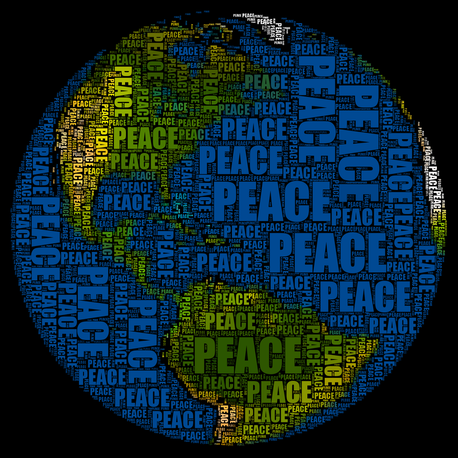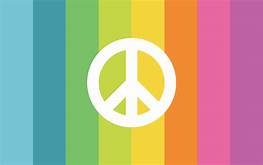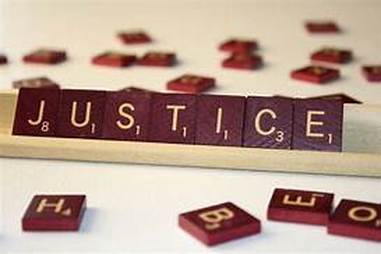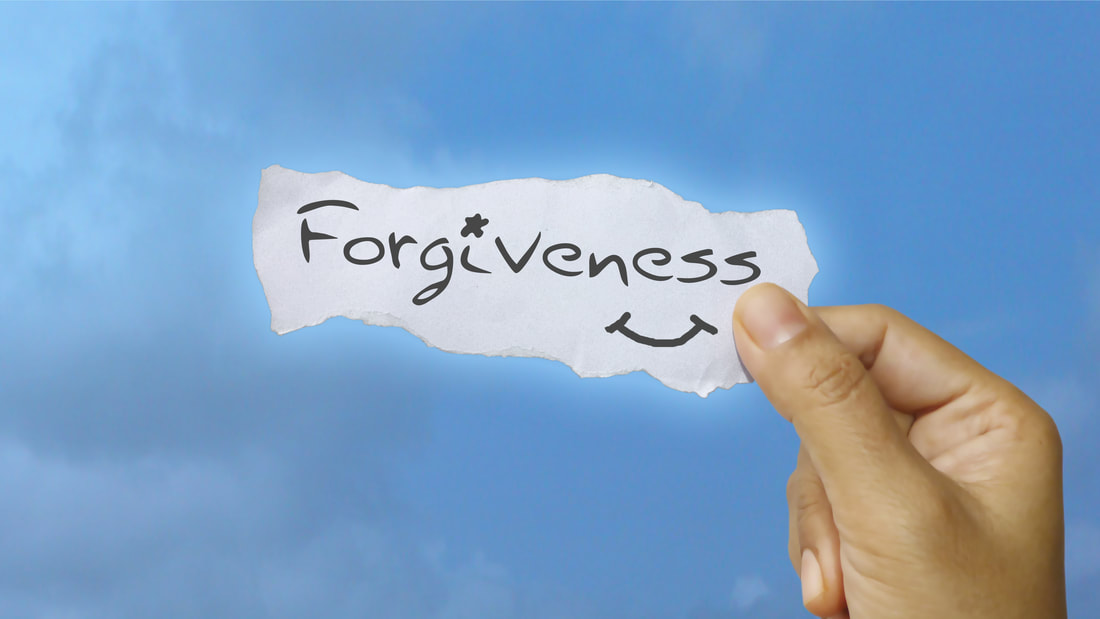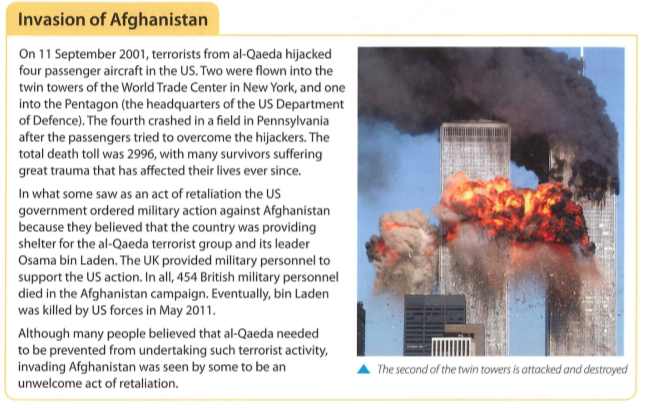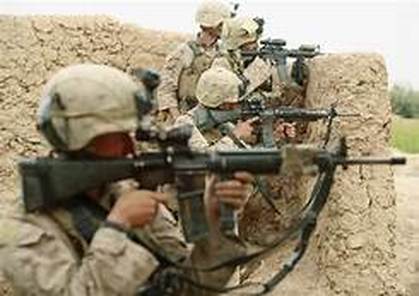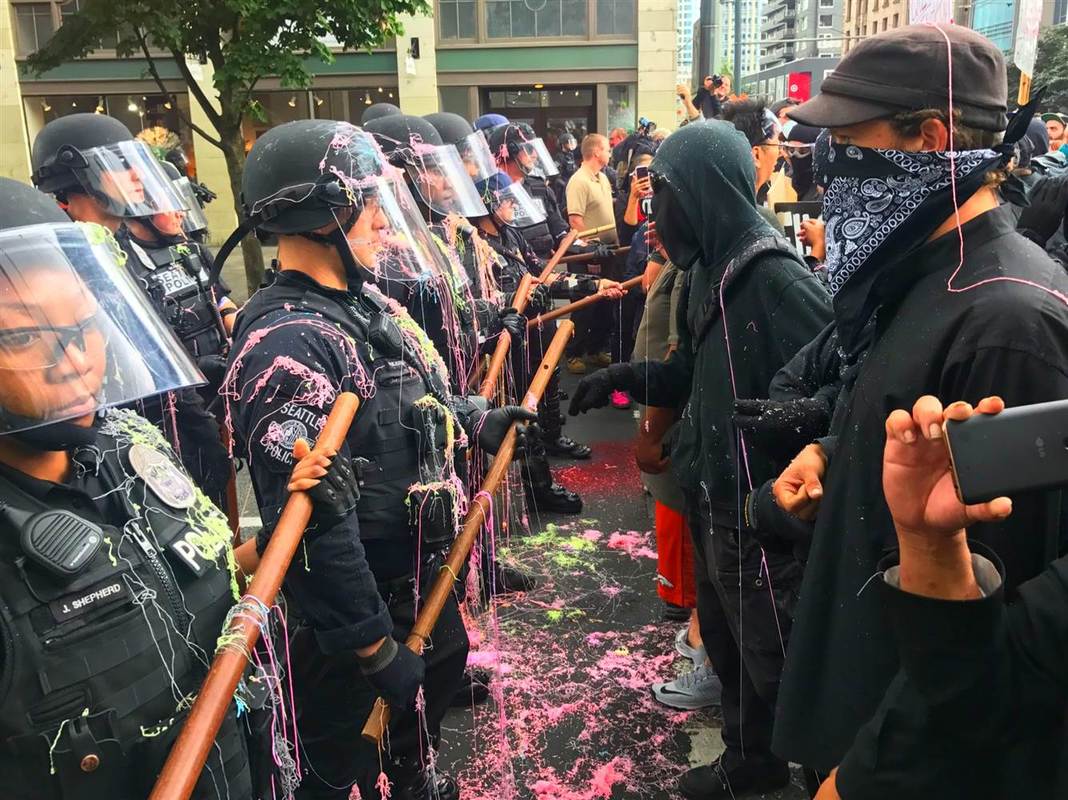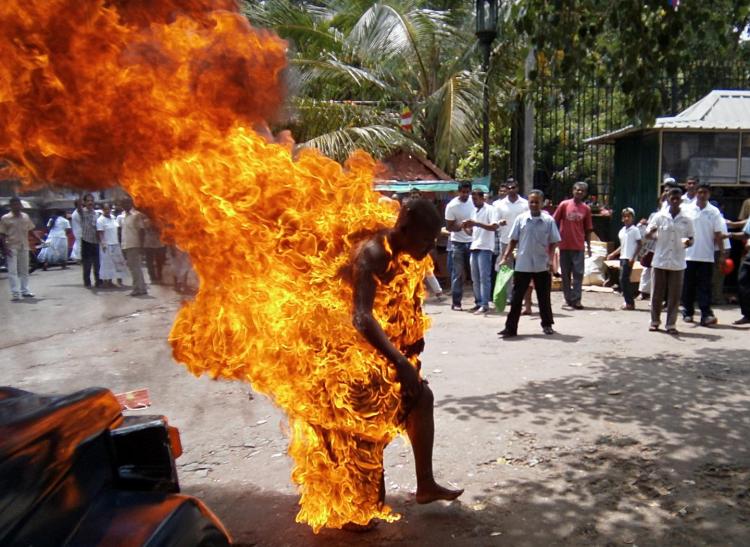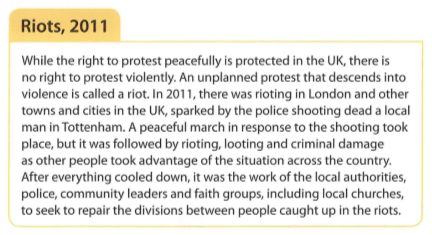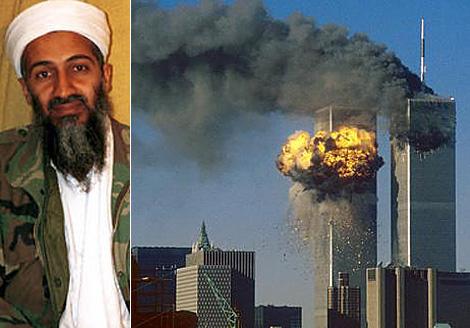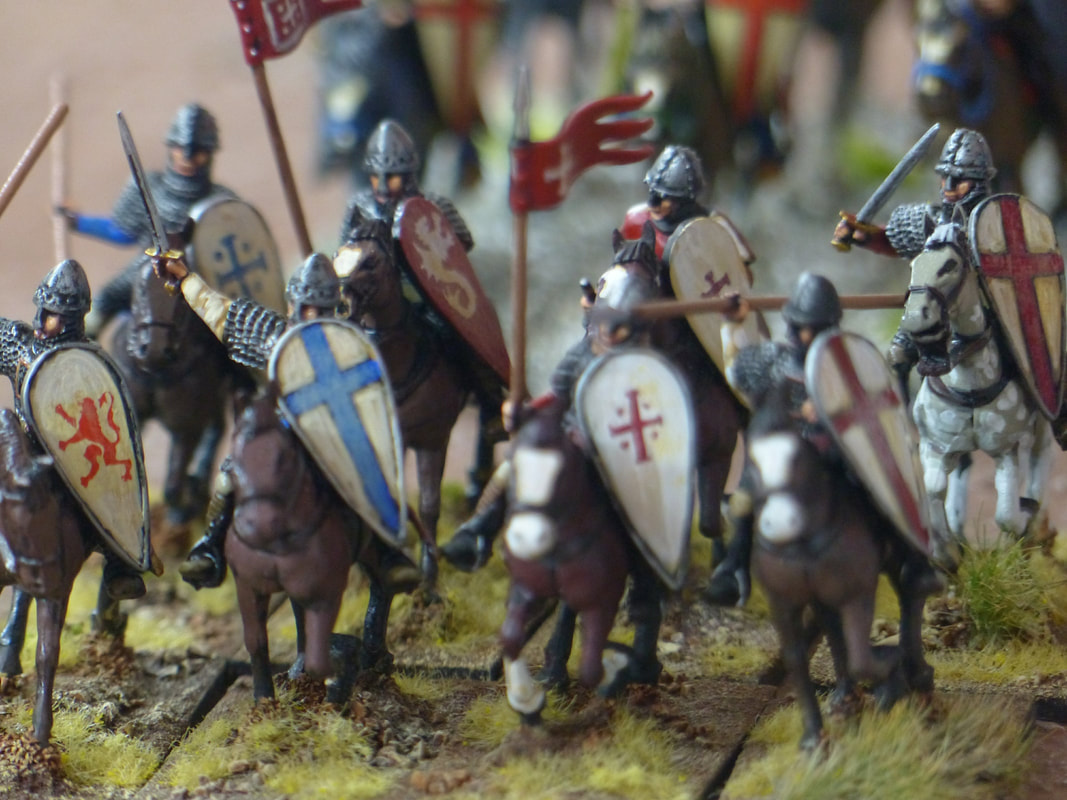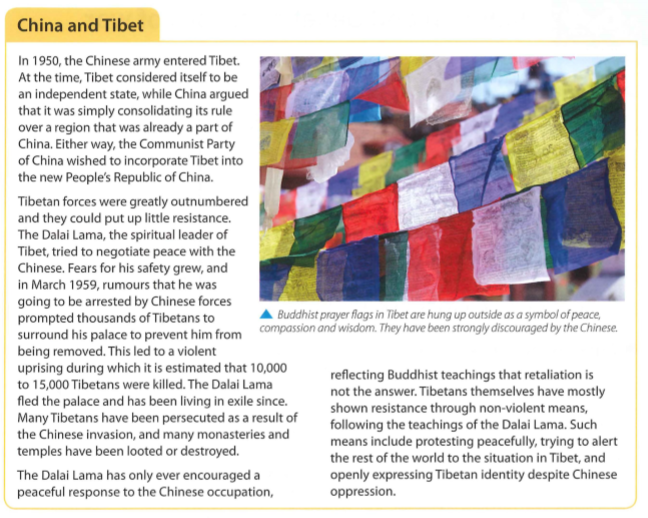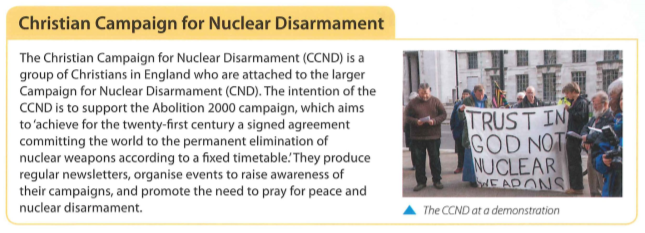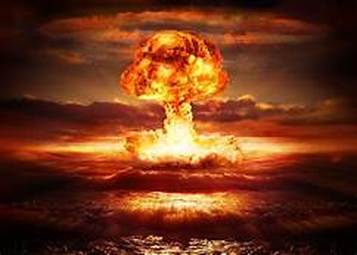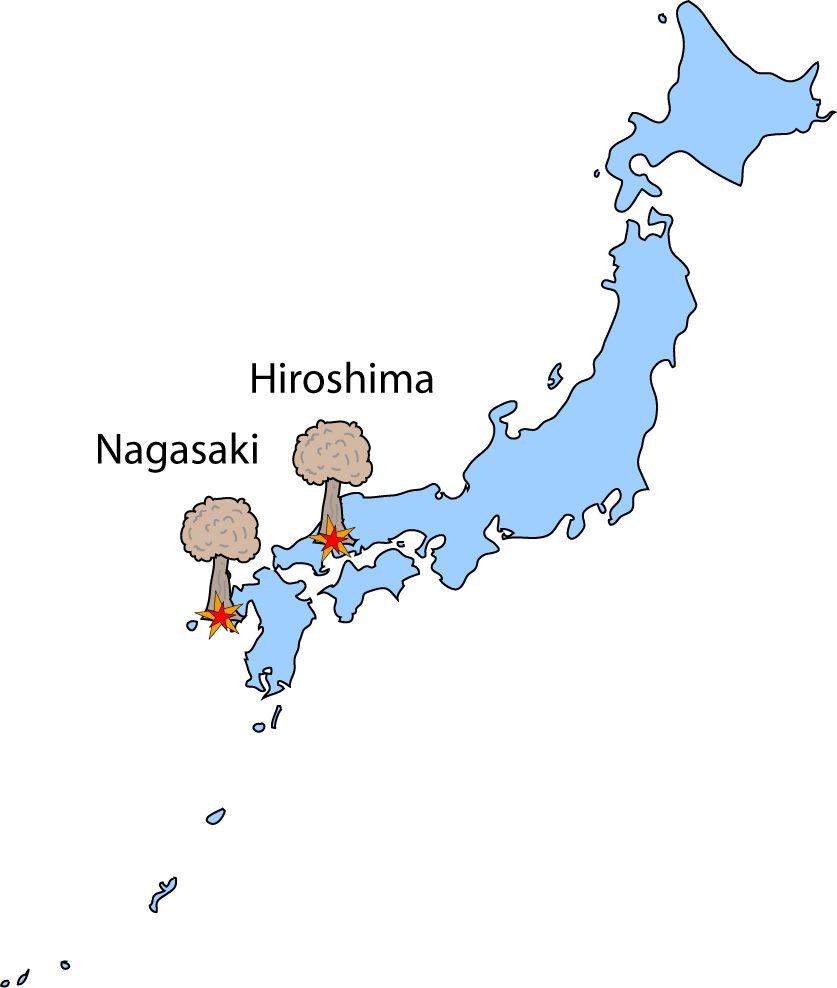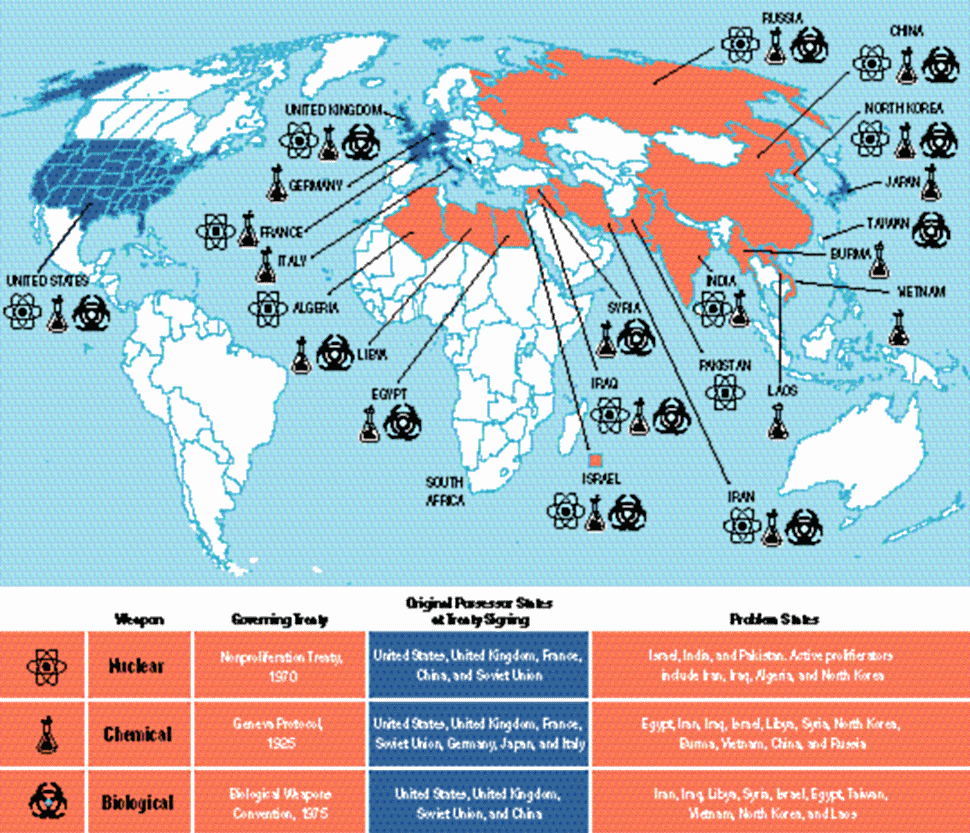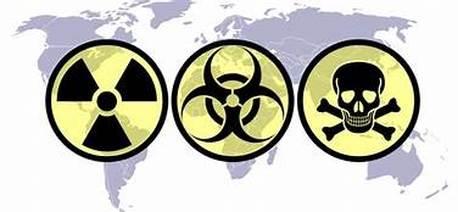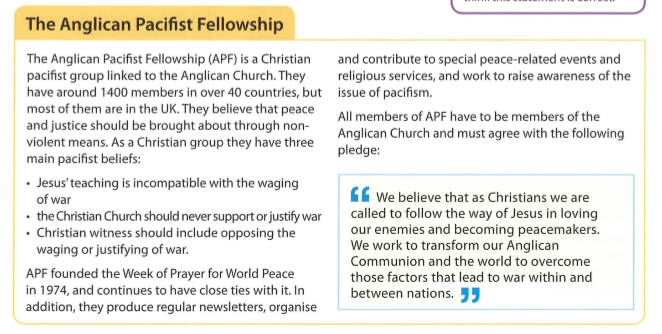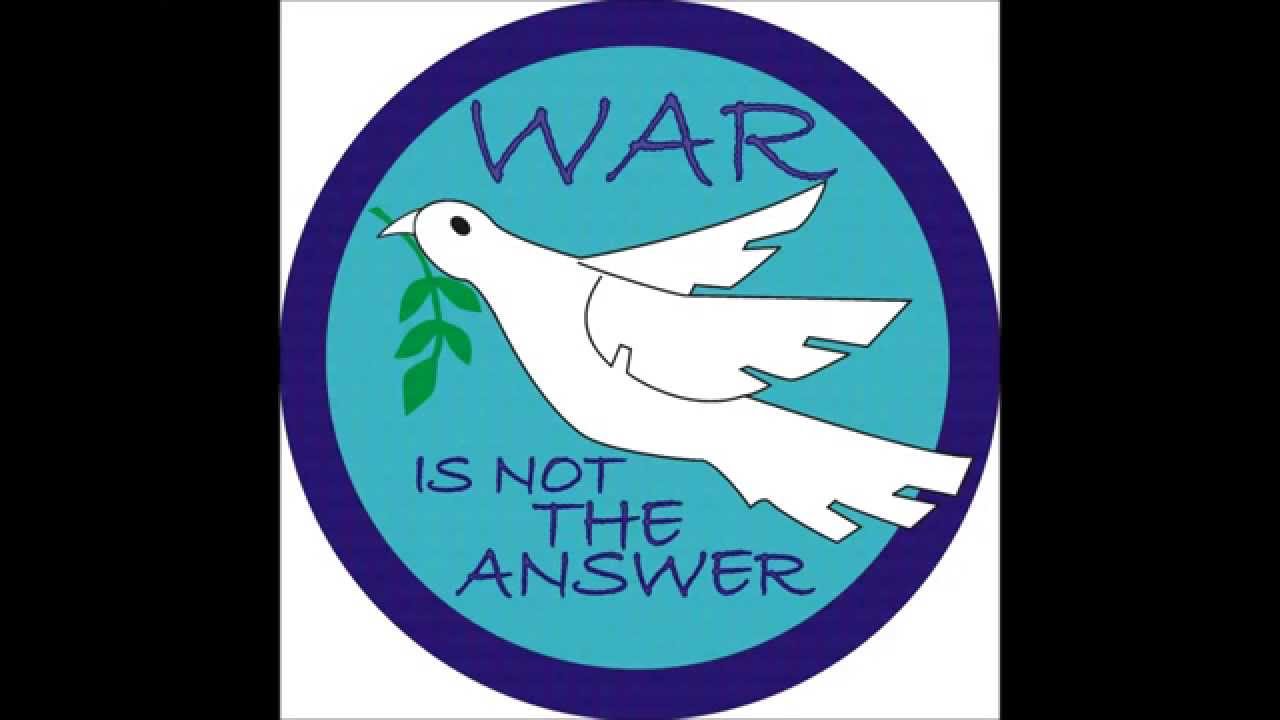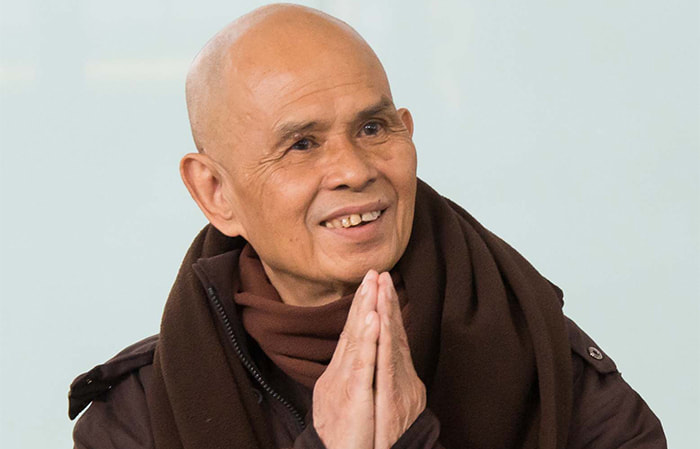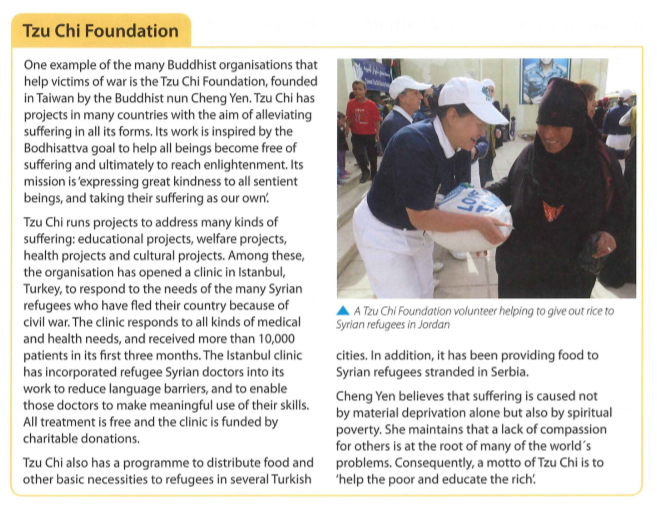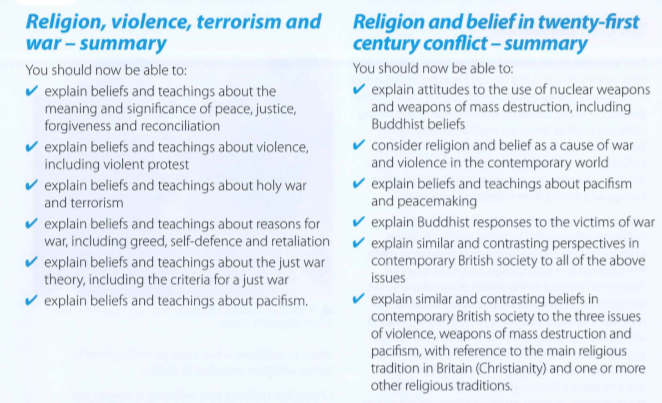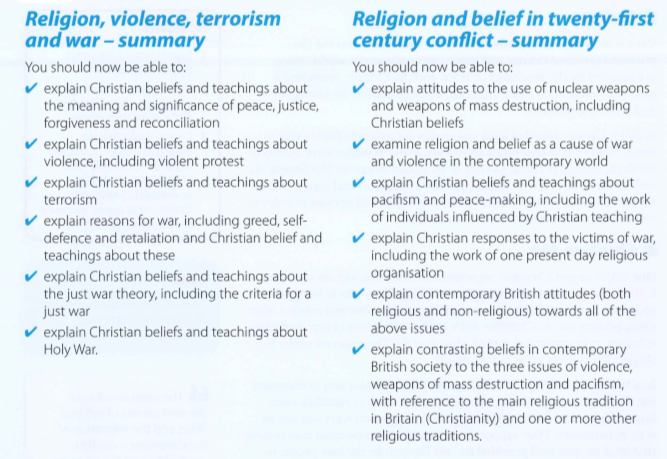|
|
|
Religion, Peace and Conflict.
Right from the beginnings of human life, people have attempted to gain territory or settle disputes through fighting. Even as you read these words, somewhere in the world people are being killed as part of a war. While all countries have laws against murder, the rules of war are different - in war, killing is considered to be acceptable.
Buddhism is very much a religion that promotes peace. Buddhist teachings say there are no justifiable reasons for war. War is wrong because it expresses and encourages hateful and greedy attitudes and behaviour, which result in suffering. Buddhism teaches that people cannot relieve their own suffering through making others suffer.
While the Christian Church may speak out against killing, and the teachings of Jesus do not support it, many Christians have been prepared to fight for their country or their faith. But there are also many Christians who disagree with war and try to prevent it from happening. For example, Quakers will never take part in a war, regardless of the reasons for it.
Religion as a cause of war and violence
In the UK, most Christians do not see the need to respond violently to what they perceive to be offensive to their religion or an attack on their faith. This does not mean they approve of such attacks; they just believe that Christian teachings do not encourage a violent response However, in the past there have been tensions in the UK between denominations in Christianity, especially between Protestants and Catholics. This was most recently evident in Northern Ireland during a period between 1968 and 1998 known as 'the Troubles'. Although many consider this to have been a political conflict rather than a religious one, it led to discrimination and acts of violence against both Protestants and Catholics.
Buddhism teaches that all things come into being because they are dependent on certain conditions, and often those conditions are complex. To reduce the reasons for starting a war to just 'religion' is probably simplifying what is a complicated matter. Most wars are caused by a number of interrelated factors- politics, economics, self-defence, retaliation, even the desire to gain territory or resources, may all play a part. While religion may divide the two sides, it is rarely the sole or main reason for the conflict.
Buddhism is very much a religion that promotes peace. Buddhist teachings say there are no justifiable reasons for war. War is wrong because it expresses and encourages hateful and greedy attitudes and behaviour, which result in suffering. Buddhism teaches that people cannot relieve their own suffering through making others suffer.
While the Christian Church may speak out against killing, and the teachings of Jesus do not support it, many Christians have been prepared to fight for their country or their faith. But there are also many Christians who disagree with war and try to prevent it from happening. For example, Quakers will never take part in a war, regardless of the reasons for it.
Religion as a cause of war and violence
In the UK, most Christians do not see the need to respond violently to what they perceive to be offensive to their religion or an attack on their faith. This does not mean they approve of such attacks; they just believe that Christian teachings do not encourage a violent response However, in the past there have been tensions in the UK between denominations in Christianity, especially between Protestants and Catholics. This was most recently evident in Northern Ireland during a period between 1968 and 1998 known as 'the Troubles'. Although many consider this to have been a political conflict rather than a religious one, it led to discrimination and acts of violence against both Protestants and Catholics.
Buddhism teaches that all things come into being because they are dependent on certain conditions, and often those conditions are complex. To reduce the reasons for starting a war to just 'religion' is probably simplifying what is a complicated matter. Most wars are caused by a number of interrelated factors- politics, economics, self-defence, retaliation, even the desire to gain territory or resources, may all play a part. While religion may divide the two sides, it is rarely the sole or main reason for the conflict.
Lesson One: What is Conflict?
|
Peace
One definition of peace is the absence of war. The intention of those fighting in a war is to create peace once the war is over. But this is often difficult to achieve, as the instability and resentment left after a war often leads to fighting breaking out again. Peace can also be thought of as a feeling of happiness, wellbeing and tranquility. This may come through religious faith, especially in prayer. and meditation. Such peace brings a calmness that helps to avoid quarrels and disputes with other people. In the Old Testament, the prophet Isaiah looks forward to a time when God will bring peace: '' He will judge between the nations and will settle disputes for many peoples. They will beat their swords into ploughshares and their spears into pruning hooks. Nation will not take up sword against nation, nor will they train for war any more. '' Isaiah 2:4 [NIV] The Buddha also taught that peace comes from within, and that it is important for Buddhists to try to develop a sense of peace. The Buddha said that violence comes from people's minds, so to stop violence people must begin by developing a sense of peace within themselves. This idea is echoed in the constitution of the United Nations Educational,Scientific and Cultural Organisation (UNESCO), which states that: '' Since wars begin in the minds of men, it is in the minds of men that the defences of peace must be constructed. '' Buddhist teachings agree with this statement. The Buddha taught that if people have peaceful minds, this will lead to peaceful speech and peaceful actions. If people's minds are at peace then the world will be at peace. Many Buddhists therefore focus on developing this sense of peace within themselves. Some Buddhists also take part in campaigns that further global peace, because creating peace through non-violent means is an important goal in Buddhism. |
|
Forgiveness
Christians believe that forgiveness is important for living peacefully. It does not necessarily mean that no action should be taken to right a wrong. But once the wrong is righted, possibly through conflict, forgiveness should follow. Action to establish peace and justice should follow the act of forgiveness, otherwise it is likely that problems will reoccur. Christians believe that God sets the example regarding forgiveness, by offering forgiveness himself to all who ask for it in faith. Buddhism teaches that forgiveness is important, both to prevent war in the first place and to establish peace after a war has ended. Forgiveness is also important in reducing suffering, because it allows people to let go of the hatred and anger that they feel. Buddhists believe that forgiveness can be developed through meditation. It is often a part of loving-kindness meditation, where a Buddhist might think forgiving thoughts towards themselves as well as other people. For Buddhists, people who have wronged them provide them with the opportunity to develop patience and forgiveness. Buddhism teaches that all beings want to be happy, but if someone has done something wrong, they will suffer as a consequence. It is therefore better to develop compassion for them rather than hatred or resentment.'' 'He abused me, he struck me, he overcame me, he robbed me: Of those who wrap themselves up in it hatred is not quenched. '' The Buddha in the Dhammapada, verse 3 |
Justice
Many wars are fought to achieve justice. The quote from Isaiah 2:4 looks forward to a time when God, as the ultimate judge, will establish justice between nations and settle their disputes. Justice is often linked with equality. If people are not given the same opportunities, this may be seen as unfair (or unjust) and lead to resentment. This could lead to conflict, especially if more privileged parts of the world are seen to be the cause of the inequality. Buddhism teaches that inflicting suffering on people through war is not the way to create a just world, because it simply causes more suffering. Most Buddhists think it is better to use non-violent means to accomplish this goal, while practising generosity and letting go (non-attachment). Reconciliation
Reconciliation follows conflict. In March 2013, when talking about conflict between France and Mali, French Foreign Minister Laurent Fabius said: --, '' We are in the process of winning the war. We also have to win the peace. And winning the peace involves a whole series of acts to help democracy and development. '' Laurent Fabius This quote illustrates the meaning of reconciliation. It is more than just apologising: it involves a conscious effort to rebuild a relationship, and sometimes much work is needed to ensure there is no more conflict. While the concepts of peace, justice, forgiveness and reconciliation are important in the aftermath of a war, they can also be important alternatives to war. For example, Quakers believe we should use these concepts as tools for preventing conflict from happening in the first place. The Quakers are a Christian denomination committed to pacifism. In order to bring about reconciliation, Buddhist teachings stress the importance of letting go of blame and resentment, because these attitudes prevent a person from developing a more harmonious relationship with others. They also contribute to the person's own suffering. Once forgiveness and reconciliation have taken place, a relationship is much stronger, because the two parties have learned to appreciate and accept each other for what they are. Forgiveness and reconciliation do not mean denying the difficulties of the past, but learning from the past to build a better, more peaceful future. |
Lesson Two: Reasons for War.
|
Some people find it very difficult to understand why anyone is prepared to fight in a war or why their country wants to go to war. However, it is a fact that people are willing to fight in wars in great numbers. Whenever the UK is involved in war, both full-time and volunteer personnel are called upon to fight. During the First and Second World War, the need for fighters was so great and casualties were so high that people in the UK were ordered to fight for their country
Greed Throughout history, war has been used as a way to gain more land or territory, or even to regain land lost in a previous war. Greed can also lead countries to invade others in order to control important resources, such as oil. In this way, rich and powerful countries can get richer and more powerful, potentially causing poverty in the defeated country when their main source of income is taken away. Christianity warns against greed. The Bible says: '' For the love of money is a root of all kinds of evil. Some people, eager for money, have wandered from the faith and pierced themselves with many griefs. '' 1 Timothy6:70 [NIV]. Buddhism teaches that greed is one of the three poisons, and one of the main causes of suffering. There are always unhealthy consequences from actions based on greed. Self Defence Whenever one country attacks another, it expects to meet some resistance from the invaded country. Most people consider fighting in self-defence to be morally acceptable, and believe they have a right to defend the values, beliefs and ways of life that their country lives by . During the Second World War the UK fought to defend itself against Nazi invasion and also to help defeat what they saw as an evil threat to the whole of Europe. In addition to defending their own country, many people believe it is acceptable to fight to defend other nations under threat. While there is little in the New Testament to justify the idea of fighting in self-defence, an argument can be made for it provided all other ways of solving the problem have been attempted and have failed. The most fundamental ethical principle in Buddhism is not to take life. While it might be acceptable to resist violence with some force, the Vietnamese monk Thich Nhat Hanh, himself a refugee of war, has emphasised that killing is never justified, and that people should instead develop compassion for those who wish to harm them. Not all Buddhists agree, and some might even feel justified in taking a life if this would save the life of a loved one. Retaliation Wars are sometimes fought against a country that is seen to have done something very wrong. From a Buddhist point of view, retaliation is just another word for vengeance, and is an expression of hatred (one of the three poisons). Actions based on hatred are not ethical, and so do not lead to healthy consequences. Responding to hatred with hatred only increases suffering; it does not relieve it. To break the cycle of violence, a different kind of response is needed, based on compassion. '' Do not repay anyone evil for evil. ... If it is possible, as far as it depends on you, live at peace with everyone. '' Romans 72:77-79[NIV] Wars are sometimes fought in retaliation against a country that is seen to have done something very wrong. When Jesus was asked about retaliation, he gave this advice: '' But I tell you, do not resist an evil person. If anyone slaps you on the right cheek, turn to them the other cheek also. '' Matthew 5:39 [NIV] Although many Christians are able to follow this advice in much of their daily interaction with other people, when it comes to situations of war, they find it much more difficult |
Lesson Three: Violence and Violent Protest.
|
The right to protest is considered to be a fundamental democratic freedom. The law in the UK allows individuals and groups to protest in public to demonstrate their point of view. If the protest involves a procession or a march, the police must be told at least six days before it takes place. The police can request alterations to the route or even apply to a court for an order to ban the march. They may do this if they feel that the march might intimidate other people or if they predict that violence will be involved. Peaceful protest was an important part of the Civil Rights movement in the USA in the 1950s and 1960s. One of the movement's leaders, a Christian pastor called Dr Martin Luther King Jr, organised peaceful rallies to protest about racial and social inequalities. Even though King was assassinated in 1968, the peaceful methods adopted by the Civil Rights movement proved successful, and equal rights legislation was passed into US law. Martin Luther King's peaceful protests reflect the belief shared by many Christians that protest to achieve what is right is acceptable, provided violence is not used.
No religion promotes violence in their teachings, and all are generally agreed that conflict should be avoided if at all possible. Religions have some slightly different teachings on when violence and conflict may be justified. Buddhist teachings are generally against violence because it contradicts the most basic ethical precept, which is not to cause harm. However, there may be circumstances where a Buddhist might view violence as justifiable. For instance, when answering a question about the possibility of someone entering a school and shooting people, the Dalai Lama responded: 'If someone has a gun and is trying to kill you, it would be reasonable to shoot back with your own gun.' This suggests that, for some Buddhists, violence and even killing could be justified in self-defence. In contrast, Thich Nhat Hanh (a well-known Buddhist teacher) has maintained a firm commitment to non-violence. When asked what he would do if he were the last monk in the world and someone were about to kill him and thus wipe out Buddhism, he answered that it would be better to let himself be killed than betray his Buddhist principles. Some Buddhists might justify a violent action if it could save a life, but others think that this would be to abandon Buddhism. Generally, Buddhism advocates non-violent forms of protest. The Cambodian monk Ghosananda provides a good example of this. In the 1990s, he led a series of non-violent marches through his country in order to encourage reconciliation and peace after decades of civil conflict, even defying the army of the Khmer Rouge (a cruel and repressive government in Cambodia). He once said, 'If I am good to someone, he or she will learn goodness and, in turn, will be good to others.' He believed that violent acts should be condemned, but that hatred should not be shown towards the person who commits them. Some Buddhist monks have committed suicide to draw attention to the repression of Buddhist teachings. For instance, in 1963 a Vietnamese monk, Thich Quang Due, set himself alight on a busy street in protest against repressive government policies. Some Buddhists see this as a breach of the first moral precept, while others think it is heroic. Despite the general Buddhist commitment to nonviolence, in recent decades some monks in Myanmar have supported violent protests against Muslims whom they believe to be the source of their problems. This has resulted in many deaths. In contrast, the Buddhist politician Aung San Suu Kyi, who is also from Myanmar, is famous for her non-violent opposition to a repressive government, which resulted in her imprisonment for many years.
|
Lesson Four: Terrorism
|
A much more serious form of violent protest is terrorism. This is where an individual, or a group who share certain beliefs, use terror as part of their campaign to further their cause. Their violence usually deliberately targets civilian and takes place in public. Suicide bombers, car bombs, and gunmen shooting into crowds of people are all tactics of terrorism. Terrorists believe that by killing people in this way, the rest of society will become more aware of their cause, will be scared of them and push the authorities into giving way to their demands.
A terrorist may associate their cause with a religion, including Christianity, but no religion promotes terrorism. Most Christians consider terrorist acts of violence to be wrong, especially as the victims are usually innocent people going about their normal daily business. They prefer more peaceful ways of resolving issues. '' The purpose of terrorism lies not just in the violent act itself. It is in producing terror. It sets out to inflame, to divide, to produce consequences which [terrorists] then use to justify terror. '' Former UK Prime Minister, Tony Blair While a terrorist may associate their cause with a religion, no religion promotes terrorism. Terrorism is a violent expression of hatred, and often leads to the harm of many people. Many Buddhists believe it is important to condemn terrorism and imprison terrorists (so that they do not harm more people), but it is also important to try to understand the root causes that provoke someone to act in such a violent way. The underlying causes are often complex and not easily understood, but a Buddhist response to terrorism involves recognising that terrorists sometimes act in extremely violent ways because they are suffering. Buddhism teaches that acts of terrorism should be countered with acts of love and compassion, rather than retaliation and more violence. Revenge solves nothing. |
|
Lesson Five: Holy War
|
To many people the concept of a holy war seems to be a contradiction. They think that no activity that involves killing people in large numbers can possibly have any religious inspiration or justification. However, in the Old Testament, there are many references to God helping the Jews to establish themselves in the Promised Land by winning bloody battles. In the Crusades (battles between Christians and Muslims in the eleventh to fourteenth centuries), both sides believed that God was helping them to win.
For Christians, a holy war must be authorised by a religious leader with great authority. The purpose of it should be to defend the Christian faith from attack. Those who take part believe they will gain spiritual rewards, and if they die in battle they will go straight to heaven. The concept of holy war does not feature widely in current Christian belief, but that does not mean that Christians are happy to see their faith attacked. Christians will still stand up for their faith but are much more likely to use the power of argument than military strength. The idea of a holy war does not make much sense for Buddhists because there is a basic commitment to non-violence in Buddhism. As we saw on the previous page, Buddhism teaches that no war can be justified, even in self-defence. This includes holy war to defend or spread the faith. |
|
Lesson Six: Just War
|
In the fourth century St Augustine was one of the first Christians to write about the morality of war, and his thoughts were developed into a distinct set of criteria by Thomas Aquinas in the thirteenth century. Further adaptations have been made to the just war theory up until the present day. It seeks to lay out the conditions under which fighting a war is justifiable, and also provides rules on how the war must be fought to ensure it is ethical. All the following conditions must apply for the war to be a just war':
• The war must have a just cause. This may include self-defence or defending someone else. It must not be to gain territory or resources, or in retaliation. • The war must be declared by the correct authority. This should be the government or lawful rulers of the country. • The intention of the war has to be to defeat wrongdoing and promote good. The good achieved by the war must outweigh the evil that led to it. • Fighting must be a last resort. All other ways of resolving the issue, such as diplomacy, must have been attempted before war can be declared. • There must be a reasonable chance of success. It is unjust to ask people to fight a war if it is probable that the war will be lost and they will be killed. • The methods used to fight the war must be proportional to achieve success. Excessive force should not be used. The way the war is fought must obey the following conditions: • The war must be fought by just means. Innocent people and civilians must not be targeted or harmed. • Only appropriate force may be used. This includes the type of force and how much is used. • Internationally agreed conventions on the conduct of war must be obeyed. The Geneva Convention, accepted by the UK government in 1957, lays down the rules that must be obeyed in war. Many Christians believe that although fighting a just war is acceptable, it is much better if there is no war, just or not. Working together to avoid situations where war is a possible outcome is preferable to fighting. The United Nations, founded in 1945, encourages countries to resolve disputes peacefully. Some Christians disagree with the theory of a just war because it defends the concept of war in certain circumstances. This could lead to a general acceptance of war. According to Buddhist ethics, all violence should be abandoned, and people should instead cultivate compassion for all beings. Consequently, there can be no such thing as a just war, even in self-defence. The general Buddhist view is that to respond to violence with more violence only adds to the problem. Buddhism teaches that people should conquer the violent tendencies within themselves, and have confidence that this will have a positive impact on the world. Most Buddhists question whether it would really be possible to fight in a war and maintain a compassionate attitude. Some Japanese Buddhist priests justified Japanese military aggression in World War II on the grounds that it was defending the nation and enabling Buddhism to survive, but many Buddhists disagree with this attitude. |
Lesson Seven: Nuclear War and Weapons of Mass Destruction
|
Nuclear Weapons
The first nuclear bomb to be used in warfare was dropped on the Japanese city of Hiroshima by American forces during the Second World War. Around 80,000 people in Hiroshima died as a result of the explosion. The death toll rose to around 140,000 as many more people died from radiation poisoning. Three days later the Japanese city of Nagasaki was destroyed by a second nuclear bomb. Five days after that, Japan surrendered and stopped fighting against the Allied forces. This marked the end of the Second World War which, for some people, justified the use of such weapons. Since the end of the Second World War, many of the wealthier countries in the world, including the UK, have researched and developed considerably more powerful nuclear weapons. Despite some countries agreeing to reduce the number of nuclear weapons they possess, there are now sufficient weapons to completely destroy the world we live in several times over. The countries that possess nuclear weapons argue that they are an important deterrent. This means that the threat that a country could retaliate with nuclear weapons prevents countries from attacking it in the first place. So far, the threat of full-scale nuclear war-which could potentially lead to human extinction-has deterred any countries from using nuclear weapons in warfare since the Second World War ended. The usual justification for nuclear weapons is that they prevent world wars from occurring due to the fear of the consequences of nuclear escalation. Defenders of nuclear weapons would point out as proof of their effectiveness the relative peace within Europe since the Second World War. Some Christians believe that the problem with nuclear weapons is not the devices themselves, but their use. It is a fundamental Christian belief that as the creator, only God has the authority to end the life that he created. One of the Ten Commandments states 'You shall not murder' (Exodus 20: 13). Some Christians believe that the use of nuclear weapons which would kill huge numbers of innocent civilians can never be justified. Speaking on behalf of four UK churches, policy adviser Steve Hucklesby said: '' Faith groups in the UK are united in their conviction that any use of nuclear weapons would violate the sanctity of life and the principle of dignity core to our faith traditions. '' Steve Hucklesby Most Buddhists believe that nuclear weapons should be abolished. They believe that as long as nuclear weapons exist, there is the risk that they will be used -perhaps through mechanical failure, human error, or because someone in power chooses to ignore the potential consequences. This means there is always the risk of full-scale nuclear war. But the situation is really more complicated than this. Thich Nhat Hanh once said: '' For peace, the basic thing to do is not to remove nuclear weapons but to remove the fear, anger and suspicion in us. If we reduce them, reconciliation is easy. '' This indicates that the real problem is not the weapons themselves but rather human attitudes, including the belief that we might solve our problems by using a weapon that would kill huge numbers of people. In a similar way, Daisaku Ikeda, a Japanese Buddhist and anti-nuclear activist, has said: ''The real enemy that we must confront is the ways of thinking that justify nuclear weapons; the readiness to annihilate others when they are seen as a threat or as a hindrance to the realisation of our' objectives' |
|
Weapons of Mass Destruction
In addition to nuclear weapons, there are other weapons of mass destruction: Chemical weapons are weapons containing lethal chemicals that, when released, cause many deaths. In 1993, the Chemical Weapons Convention (CWC) made the production, stockpiling and use of these chemicals illegal, worldwide. However, since then they are believed to have been used in countries such as Iraq and Syria. Biological weapons introduce harmful bacteria and viruses into the atmosphere. When they enter the food chain or water supplies, they cause illness and death on a massive scale. As with chemical weapons, they are illegal but there are instances of their use and many countries still possess them. As with nuclear weapons, chemical and biological weapons have the capacity to kill large numbers of people, including civilians. Although a life of a person in the military is worth the same as any other life, the rules of war allow military personnel to be valid targets. Civilians pose no threat and so they are supposed to be protected. Some people justify war by using this quote from the Bible: '' If there is a serious injury, you are to take life for life, eye for eye, tooth for tooth . . . ' ' Exodus 2 7:23-24 [NIV] This quote was originally intended to introduce a sense of proportion into the way people respond to each other. It cannot be used to justify nuclear weapons or weapons of mass destruction. It would have to read 'many lives for a life, many eyes for an eye and a whole mouthful of teeth for a tooth'. No religion promotes the use of weapons of mass destruction. Their reasons for opposing them reflect their individual beliefs. Buddhists believe that the use of weapons of mass destruction is an evil action that can follow a person into their next life and cause bad effects. Christians do not believe in karma but a Christian's view may be that the use of weapons of mass destruction is counter to the teachings of Jesus, who was a pacifist, and therefore wrong. Weapons of mass destruction make it easy to kill large numbers of people based on a single decision. This is why they are particularly dangerous from a Buddhist point of view, because just a single moment of rage could lead to harming many beings. Many Buddhists think that better safeguards are needed against the power of people's aggressive, even hateful impulses, and the availability of weapons of mass destruction offers a potentially catastrophic outlet for them. Moreover, the people who suffer as a consequence of such weapons are not usually the ones responsible for conflict. Weapons of mass destruction kill indiscriminately and so their use cannot be defended. |
Lesson Eight: Peace-making
Lesson Nine: Religious responses to victims of War.
|
Casualties are an unavoidable part of war. In addition to the harm that is caused to those directly involved in the fighting, harm is also caused to their families and friends. For example, if the main wage earner dies in a war, their family may struggle financially without them. If a place of work is destroyed in a war, nobody can earn a wage there. If crops are destroyed or water supplies polluted, starvation could follow for those who live in the surrounding area.
In the UK if a member of the military is killed or injured, financial systems are in place to look after those left behind. Injured military personnel receive free health care, with some specialised care being provided by charities such as Help for Heroes. However, injury or death still has devastating effects on friends and families and can cause longterm emotional wounds. There are many organisations that offer help and care for victims of war, wherever they live and whichever side of the conflict they fought on. These organisations believe that the life and welfare of human beings is all that matters. Many Christians support such organisations because a basic Christian belief is to 'Love your neighbour as yourself' (Mark 12:31). Jesus explained this to his followers by telling the parable of the Good Samaritan (Luke 10:25-37). The meaning he was conveying is that everybody is everybody else's neighbour, regardless of race, age, gender, religion or political beliefs. Buddhists believe that all suffering should be stopped, whatever its origin. This means that Buddhists want to help victims of war, as well as victims of natural disasters, or victims of poverty or violence. In addition to this, Buddhists believe that the perpetrators of war and violence also need people's compassion because they too suffer. Many Buddhists believe that victims of war need psychological and spiritual help, in addition to the basic necessities required for survival. Refugees have often witnessed horrible events, been displaced from their homes, and lost most or all of their possessions. They must live with the memories of what they have passed through, and this may mean that they need psychological support to adjust to all of the changes they have experienced. One aspect of this is their attitude towards their oppressors. A refugee can be left not only with psychological trauma but with anger, bitterness and even hatred towards the aggressors. Buddhism teaches that these attitudes are self-destructive and victims of war are likely to need help to let go of them. Cultivating compassion towards the aggressors not only helps the victims but also enables the aggressors to change. The aggressors too want to be happy but are going about it in the wrong way. Thich Nhat Hanh confirms that it is not only the victims that need help but also the aggressors. He argues, 'When another person makes you suffer, it is because he suffers deeply within himself, and his suffering is spilling over. He does not need punishment; he needs help. That's the message he is sending.' |
Caritas
Caritas is a Catholic organisation whose mission is to serve the poor and promote charity and justice throughout the world. They are inspired by the teachings of Jesus and the Church, providing a practical response to those suffering through conflict by saving lives and relieving suffering. In 2015, Caritas provided food and shelter for refugees fleeing war in Syria. Hundreds of thousands of Syrians, many of whom were elderly or children, made a perilous journey to European countries like Greece. As well as food and shelter, Caritas provided translators and legal services for the refugees, so they would know their rights and options in order to make informed decisions about their futures. Christian Aid One of the largest Christian organisations that helps victims of war is Christian Aid, which was set up in the 1940s. They aim to bring aid to end poverty, whatever the cause or circumstance. War and conflict often cause poverty and so Christian Aid's work with victims of war, including refugees, is an important part of what they do. They operate under the slogan: 'We believe in life before death'. In addition to working with victims, Christian Aid also aim to eliminate the causes of poverty. In the case of war, they work to establish basic human rights and fairness in society, in the hope that wars will not be seen as necessary. They support local organisations because they believe that local people, well provided for, are likely to be the best people to deal with problems. Recent campaigns have included raising awareness of refugees in and from Gaza, Afghanistan and Syria, in order to raise funds to offer practical support. Christian Aid's main fundraising activity is Christian Aid Week. This occurs in May each year. Special envelopes are distributed to homes in the UK and then collected with a donation inside. Christian Aid also receive regular or one-off donations from the public, and support from the UK government and European Commission. ''The need to address the root causes of refugee flows and the migration of the desperate- conflict, inequality, and the impacts of climate change, to name but three- has never been greater. '' Christian Aid |
